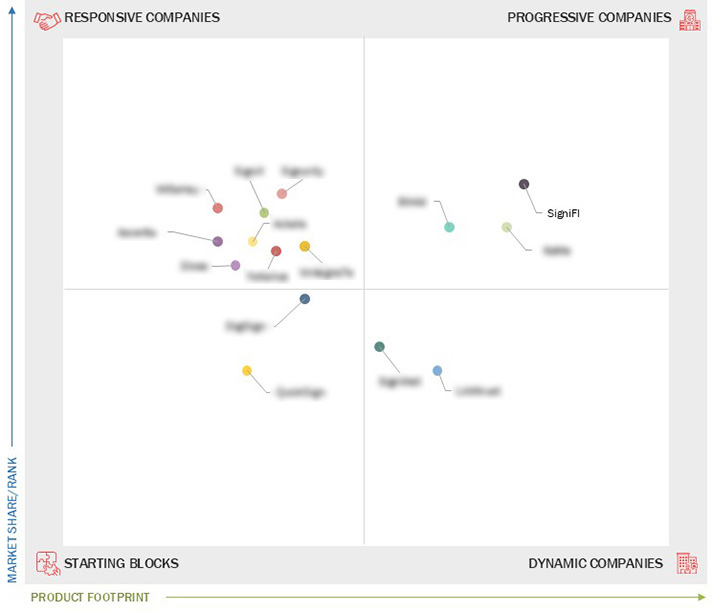Comparing 15 vendors in Digital Signature Startups across 0 criteria.
A digital signature is an electronic form of a signature that uses an advanced mathematical technique to verify the authenticity and integrity of digital messages/documents as well as the identity of the signer. Digital signatures are safer and more secure than traditional pen-and-paper signatures. The digital signature ensures the information originates from the signer and is unaltered. They are the fastest way to authenticate a signer’s identity and are strong proof that the signer and no one else has signed the document.
Market Leadership Quadrant
1.1 Study Objectives
1.2 Market Definition
1.3 Study Scope
1.3.1 Market Segmentation
1.3.2 Inclusions and Exclusions
1.3.3 Years Considered
1.4 Currency Considered
1.5 Stakeholders
1.6 Summary of Changes
2.1 Introduction
2.2 Market Dynamics
2.2.1 Drivers
2.2.1.1 Rising incidences of digital frauds
2.2.1.2 Stringent regulatory standards and data privacy compliances
2.2.1.3 Increasing popularity of e-commerce and remote work
2.2.1.4 Secure authentication and streamlined workflows with digital
signatures
2.2.2 Restraints
2.2.2.1 High initial setup costs
2.2.3 Opportunities
2.2.3.1 Enhancing customer experiences with digital signature
integration
2.2.3.2 Digital signature adoption through cloud enhanced security
solutions
2.2.3.3 Navigating wave of digital signature market consolidations
2.2.3.4 Surge in adoption of AI technologies
2.2.4 Challenges
2.2.4.1 Interoperability issues in cross-vendor digital signature
solutions
2.3 Value Chain Analysis
2.4 Ecosystem Analysis
2.5 Impact of Generative AI on Digital Signature Market
2.5.1 Generative AI
2.5.2 Top Use Cases and Market Potential in Digital Signature Market
2.5.3 Impact of Generative AI on Interconnected and Adjacent Ecosystems
2.5.3.1 Security and fraud detection
2.5.3.2 Regulatory bodies and certification authorities
2.5.3.3 PKI and digital certificates
2.5.3.4 Quantum-resistant digital signatures
2.5.3.5 Integration with emerging technologies
2.6 Trends/Disruptions Impacting Customer Business
2.7 Patent Analysis
2.8 Trade Analysis
2.8.1 Import Scenario of Recording Media: Discs, Tapes, Solid-State
Devices, Smart Cards, and Production Materials
2.8.2 Export Scenario of Recording Media: Discs, Tapes, Solid-State
Devices, Smart Cards, and Production Materials
3.1 Key Player Strategies/Right to Win, 2022–2024
3.2 Revenue Analysis, 2019–2023
3.3 Market Share Analysis, 2023
3.4 Brand Comparison
3.4.1 Docusign
3.4.2 Adobe
3.4.3 Thales
3.4.4 Digicert
3.4.5 Entrust
3.5 Company Valuation and Financial Metrics
3.5.1 Company Valuation, 2024
3.5.2 Financial Metrics USing EV/Ebidta
3.6 Company Evaluation Matrix: Startups/SMEs, 2023
3.6.1 Progressive Companies
3.6.2 Responsive Companies
3.6.3 Dynamic Companies
3.6.4 Starting Blocks
3.6.5 Competitive Benchmarking: Startups/SMEs, 2023
3.6.5.1 Detailed list of key startups/SMEs
3.6.5.2 Competitive benchmarking of key startups/SMEs
3.7 Competitive Scenario
3.7.1 Product Launches & Enhancements
3.7.2 Deals
4.1 DIOSS
4.1.1 Business overview
4.1.2 Products/Solutions/Services offered
4.1.3 Recent developments
4.2 QUICKSIGN
4.2.1 Business overview
4.2.2 Products/Solutions/Services offered
4.2.3 Recent developments
4.3 NOTARIUS
4.3.1 Business overview
4.3.2 Products/Solutions/Services offered
4.3.3 Recent developments
4.4 ACTALIS
4.4.1 Business overview
4.4.2 Products/Solutions/Services offered
4.4.3 Recent developments
4.5 SIGNIX
4.5.1 Business overview
4.5.2 Products/Solutions/Services offered
4.5.3 Recent developments
4.6 SIGNIFLOW
4.6.1 Business overview
4.6.2 Products/Solutions/Services offered
4.6.3 Recent developments
4.7 VINTEGRISTECH
4.7.1 Business overview
4.7.2 Products/Solutions/Services offered
4.7.3 Recent developments
4.8 SIGNORITY
4.8.1 Business overview
4.8.2 Products/Solutions/Services offered
4.8.3 Recent developments
4.9 BIT4ID
4.9.1 Business overview
4.9.2 Products/Solutions/Services offered
4.9.3 Recent developments
4.10 LAWTRUST
4.10.1 Business overview
4.10.2 Products/Solutions/Services offered
4.10.3 Recent developments
4.11 DIGISIGNER
4.11.1 Business overview
4.11.2 Products/Solutions/Services offered
4.11.3 Recent developments
4.12 WISEKEY
4.12.1 Business overview
4.12.2 Products/Solutions/Services offered
4.12.3 Recent developments
4.13 ITSME
4.13.1 Business overview
4.13.2 Products/Solutions/Services offered
4.13.3 Recent developments
4.14 SIGNWELL
4.14.1 Business overview
4.14.2 Products/Solutions/Services offered
4.14.3 Recent developments
4.15 ASCERTIA
4.15.1 Business overview
4.15.2 Products/Solutions/Services offered
4.15.3 Recent developments


 ks_report
ks_report
 Feb 2023
Feb 2023

